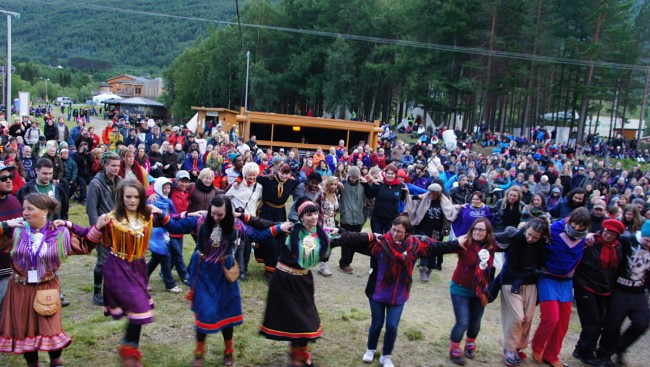Continuing reports from the Annual Meeting of the American Academy of Religion.
The afternoon opened with a panel on the New Animism hosted between the Pagan Studies and the Ritual Studies research groups. Briefly (and somewhat simply) the “new Animism” covers a body of ideas, somewhat gravitating around the work of Graham Harvey, to understand “animism” as a set of practices and behaviors which see an ethical relationship between humans and non-human persons.
Graham Harvey discussed his research of the Riddu Riddu festival in subarctic Norway, a Sami festival which brings together performers from indigenous communities around the world, exploring the intersection between ritual and performance, religion and entertainment. Perhaps one of the more interesting performances he discussed, albeit briefly, was a Sami theater group doing a performance on the Descent of Inanna.
His presentation was followed by a paper by Sabina Magliocco on how contemporary Pagans engage with animals and animal spirits. Based on her research, she argued that animals often have an important symbolic importance for many contemporary Pagans, but that this is primarily expressed through a romantic lens. In fact, she found that there was not a strong correlation between spiritual beliefs about animals and behavior that sustains animal welfare or broader environmental sustainability. The difference in actual change in behavior around sustainable practices was negligible between Pagans and atheists or agnostics she surveyed. What she suggested was that direct experience with actual animals was far more important creating sustainable behaviors then romantic ritualized experiences. She did mention interesting work by Lupa Greenwolf, whose engagement with the animal world in a sustainable manner she saw as exceptional, though increasingly influential on the contemporary Pagan world, where the symbolic ideals focus more on substantive real relationships with animals.
The final presentation in this section was from Samuel Etikpah, from the University of Oslo, discussing the Kundum festival, which is traditionally celebrated in Ghana but also within immigrant communities in Atlanta. His argument, using both the longstanding understanding of festival and ritual as providing moments of transition and Graham Harvey’s ideas, was that in the Kundum festival other-than-human beings are brought into play as part of creating hoped for transitions in relation to the environment.

